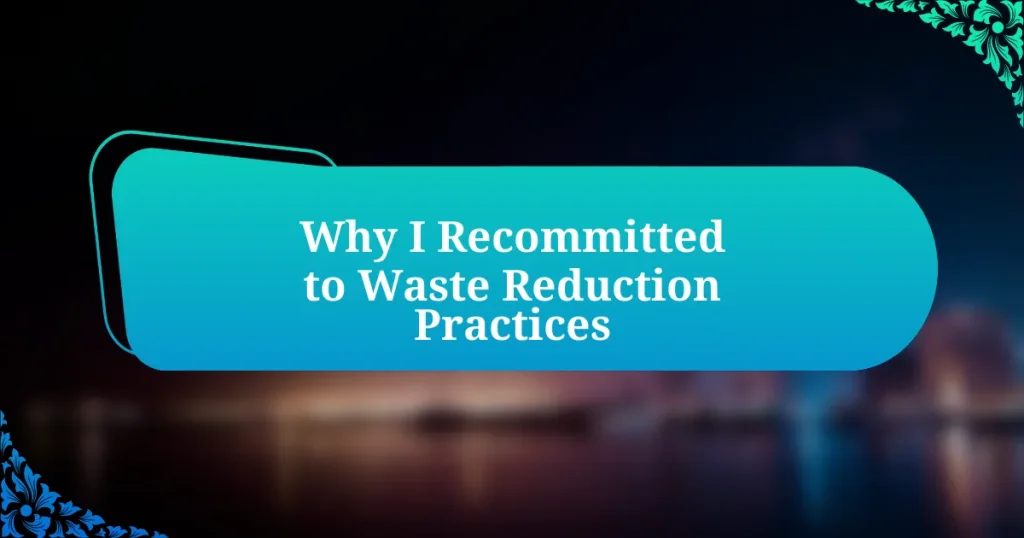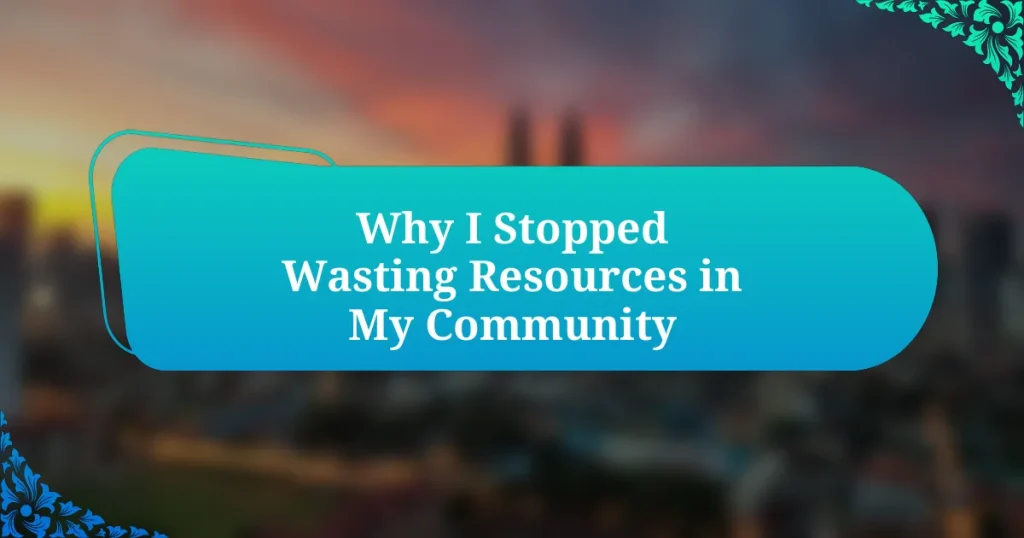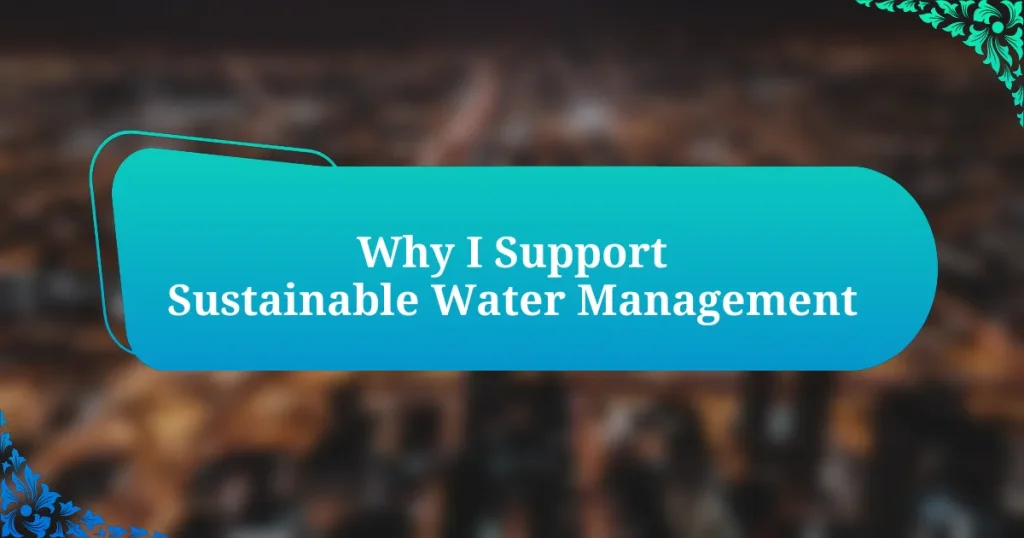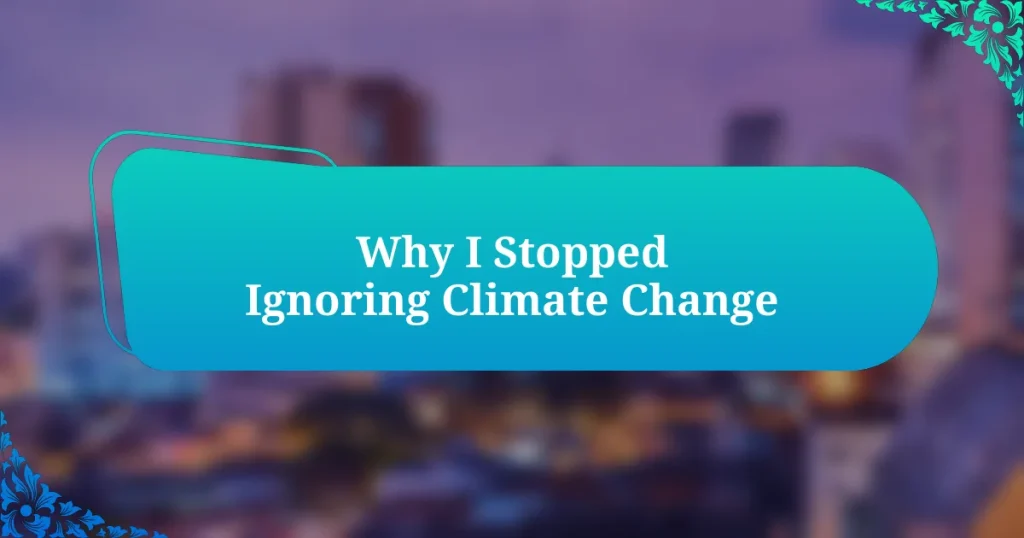Key takeaways:
- Waste reduction is a personal commitment that involves making intentional lifestyle changes, such as using reusable bags and reducing disposable products.
- Smart city technology enhances waste management through efficient collection systems, community engagement, and data analytics to identify waste patterns.
- Benefits of waste reduction include environmental protection, economic savings, and improved public health, emphasizing the impact of mindful choices on community wellbeing.
- Practical tips for waste reduction include using reusable items, planning shopping trips to avoid excess waste, and composting to create a beneficial waste cycle.
Author: Clara Whitfield
Bio: Clara Whitfield is an acclaimed contemporary author known for her poignant storytelling and evocative prose. With a background in psychology, she intricately weaves themes of human emotion and personal growth into her narratives. Clara’s debut novel, The Echoes of Yesterday, received critical acclaim and garnered her a loyal readership. When she’s not writing, Clara enjoys exploring nature and visiting local coffee shops, where she often draws inspiration for her next story. She currently resides in Portland, Oregon, with her two rescue dogs.
Understanding waste reduction practices
Understanding waste reduction practices is more than just a trend; it’s a commitment to a sustainable lifestyle. I remember when I first grasped the concept of “reduce, reuse, recycle.” It seemed overwhelming at first, but then I realized that it’s about making small, intentional changes—like carrying a reusable bag or choosing products with minimal packaging. Have you ever stopped to think about the impact of those choices?
The emotional weight of waste can be heavy. I once felt guilty about my consumption habits after visiting a landfill; seeing mountains of discarded items made me reconsider my daily choices. This prompted me to dive deeper into what waste reduction really means. It’s not just about throwing less stuff away; it’s about fostering a mindset that values quality over quantity.
When I discuss waste reduction with friends, I often ask them to reflect on their habits. Do we value convenience over sustainability? I’ve found that engaging in discussions about where our waste ends up encourages more mindful decisions. It’s about challenging each other to be better and recognizing that every small step matters in the grand scheme of reducing our environmental footprint.
Role of smart city technology
Smart city technology plays a pivotal role in transforming our waste management practices. For instance, I remember visiting a city that implemented smart bins equipped with sensors to monitor waste levels. It was fascinating to see how these bins optimized collection routes, reducing fuel consumption and ensuring timely pickups. Have you ever thought about how technology can turn waste management into a more efficient process?
In addition to enhancing efficiency, smart city technology fosters community engagement. I chatted with local residents who shared how apps linked them to real-time information on recycling drop-off points and waste reduction events. This connectivity inspired them to participate more actively, knowing their contributions could lead to significant environmental benefits. Isn’t it amazing how technology can shape our daily decisions?
There’s also a layer of data analytics that can be utilized to understand waste patterns better. When I learned about cities analyzing waste composition data, it struck me how this insight can drive targeted programs for waste reduction. Imagine if we could identify the most discarded items in our neighborhoods and develop campaigns to address these habits directly. Doesn’t it make you curious about how much we can change with just a bit of information?
Benefits of waste reduction
The benefits of waste reduction stretch far beyond just the environmental impact. I recall a community cleanup I joined, where we collected not just trash but a surprising amount of recyclable materials. Witnessing how much waste could be diverted from landfills really drove home the idea that even small changes in our habits could make a significant difference. Have you ever considered how much you could reduce your footprint by simply being more mindful of what you throw away?
Reducing waste can also lead to considerable economic savings. I found it interesting when my neighbor shared how his family cut down on disposables, saving them money that they redirected to a local charity. It was a personal reminder that every piece of waste we avoid not only protects our resources but can also enhance our community’s wellbeing. How often do we think about the financial benefits of making smarter choices in our consumption?
On a broader scale, waste reduction contributes to improved public health and quality of life. I remember an article highlighting a city that significantly decreased pollution levels through comprehensive waste management strategies. It left me pondering how much our surroundings affect our health and happiness. Isn’t it inspiring to think that by rethinking our waste practices, we can promote a healthier environment for future generations?
Integration of smart technology
Integrating smart technology into waste reduction practices offers exciting opportunities to enhance efficiency and accountability in our communities. I remember when my city implemented smart waste bins that notify collectors when they’re full. The change dramatically improved collection routes and reduced unnecessary trips, which not only saves fuel but also minimizes our carbon footprint. Have you experienced the difference that technological upgrades can make in your community’s waste management?
Moreover, smart technology enables real-time data collection on waste generation patterns. During a recent workshop, a speaker showcased how a smart app tracked citizens’ recycling habits, allowing the city to offer tailored incentives. I found it fascinating how data-driven strategies can foster a culture of responsibility and motivate residents to waste less. Isn’t it uplifting to think we can harness our collective efforts for a smarter, cleaner city?
Finally, the integration of smart solutions encourages greater community engagement. I’ve participated in local initiatives where residents use apps to report large waste or litter issues in their neighborhoods. This level of participation not only cultivates shared responsibility but also empowers individuals, making us feel more connected to our environment. Isn’t it amazing how technology can bridge the gap between citizens and their local ecology?
Personal motivation for waste reduction
Waste reduction has become a deeply personal mission for me, stemming from a moment of clarity. I distinctly recall standing in front of a mountain of discarded plastic at a local cleanup event. The sight was jarring, and it left me questioning my own consumption habits. Have you ever felt that urge to make a change after witnessing the impact of waste firsthand? It sparked a determination within me to not only reduce my waste but to inspire others to do the same.
One driving factor for my commitment to waste reduction is the desire to leave a better world for future generations. As I watch my niece grow, I ponder the environment she will inherit. I want to show her that our daily choices matter. How can we stand by while our planet bears the consequences of our convenience? This thought fuels my dedication; every small action I take feels like a stepping stone towards a healthier planet.
Additionally, I find immense satisfaction in the simplicity of making mindful choices. It’s invigorating to embrace practices like composting and minimalism, which not only reduce waste but also create a sense of clarity in my life. Have you tried decluttering your space? I was amazed at how freeing it felt to let go of items I no longer needed. This journey isn’t just about waste reduction; it’s about finding joy in conscious living.
How I began my journey
When I first realized how much waste I was generating, I decided to take a closer look at my daily habits. One afternoon, I found myself emptying an overflowing trash can, and as I sorted through the mix of wrappers, bottles, and takeout containers, it struck me how easily I had fallen into a cycle of convenience. Have you ever considered how often you opt for disposable options without a second thought? That day, I made a commitment to be more mindful.
Inspired by that moment, I enrolled in a local workshop on zero-waste living. It was eye-opening to connect with like-minded individuals who shared their experiences, successes, and setbacks. Listening to their stories made me realize that I wasn’t alone in this journey. I remember someone sharing how they replaced single-use items with reusable alternatives, and it resonated with my desire to make tangible changes. Isn’t it incredible what we can learn from each other’s journeys?
The more I practiced waste reduction, the more I noticed its impact on my life. I embraced meal prepping, which not only minimized food waste but also saved me time and money. Watching my fridge fill with colorful, fresh ingredients instead of takeout leftovers felt like a small victory. What small changes have you made that unexpectedly brought joy to your routine? In my case, it was these wins—small but meaningful—that motivated me to stay committed to this path.
Tips for effective waste reduction
Making small changes in our daily routines can lead to significant waste reduction. For instance, I started carrying a reusable water bottle everywhere I went. Initially, it seemed like a minor tweak, but I quickly realized it not only cut down on plastic waste but also saved me money on buying bottled water. How many single-use bottles have you tossed in the past week alone?
I also found that planning my shopping trips helped mitigate excess waste. By creating a detailed list and sticking to it, I reduced impulse buys that often ended up as waste. There was one time I skipped the grocery store aisle filled with tempting snacks, and that small choice led to a week of meals made entirely from fresh produce. Have you ever felt that satisfaction of using every last item in your pantry?
Finally, I advocate for composting as a powerful step towards waste reduction. After starting my own compost bin, I was amazed at how much food waste transformed into nutrient-rich soil. It felt rewarding to contribute to a circular ecosystem rather than sending everything to the landfill. Have you ever considered how composting can turn your kitchen scraps into something beneficial?














